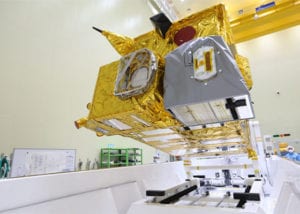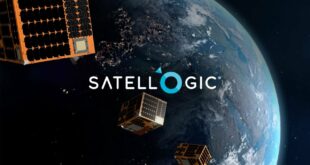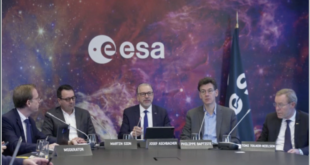
South Korean environmental monitoring and oceanographic satellite Chollian-2B is expected to be launched on board an Arianespace Ariane-5 satellite launch vehicle from the Guiana Space Centre on 18 February 2020, according to the South Korean Ministry of Science and Information Communication Technology.
Chollian-2B is fitted with two sensors, the Geostationary Environmental Monitoring Spectrometer (GEMS) to measure air pollution, and the Geostationary Ocean Colour Imager-2 (GOCI-2) for monitoring the ocean environment. According to the Korean Aerospace Research Institute (KARI), Chollian-2B is the first geostationary satellite to be fitted with a GEMS sensor.
The Chollian-2B, and its sister Chollian-2A (launched in December 2018) is a follow-up satellite to Chollian-1, South Korea’s first geostationary meteorological satellite launched in June 2010.
Chollian-1 was designed for oceanography and meteorological Earth observation and was able to capture imagery of modest capability when compared with its successors, Chollian-2A and Chollian-2B, that are designed to capture imagery with much higher resolution and faster download speeds.
Chollian-2A and -2B are part of the GEO-KOMPSAT-2 (GK-2) series of meteorological and environmental monitoring satellites that will operate from geostationary orbit.
Chollian-2A (GK-2A) provides terrestrial and space weather monitoring, and is equipped with an Advanced Meteorological Imager (AMI) and a Korean Space Environment Monitor (KSEM) payloads, and maintains position at 128.2° East.
Chollian-2B (GK-2B) will focus on air pollution monitoring and oceanography.
Both satellites share the same bus, and are expected to have an operational lifetime of 10 years each.
KARI and the Korean Meteorological Administration (KMA) signed an agreement with the French national space agency, the Centre national d’études spatiales (CNES), to participate in the French-led Space Climate Observatory (SCO) that will provide global and persistent environmental monitoring to help mitigate the effects of climate change.





